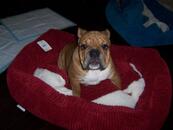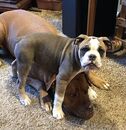- Jul 28, 2011
- 48,599
- 3,692
- Country
- USA
- Bulldog(s) Names
- Chelios (Frenchie), Cubby (Frenchie) Nitschke (2004-2011) Banks (2005-2014) and Lambeau (2014-2024)
View attachment 65652View attachment 65653View attachment 65654View attachment 65655View attachment 65656
Heres my PRECIOUS baby!! Shes not spoiled any
She is a beauty and better be spoiled, we all damn it
 :D
:D








